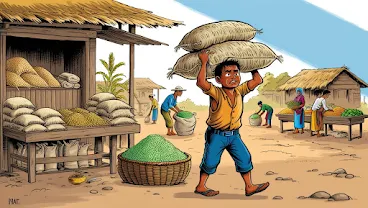As the summer sun blazes down, the arrival of monsoon seems like a distant promise—a whisper in the wind, a hope for respite from the scorching heat. Yet, for those who understand the rhythm of life, the rains are not just a season; they are an event to prepare for. In a small town, nestled between fields of golden crops and the winding roads leading to bustling markets, a man loads sacks of rice onto a bullock cart. He knows not what tomorrow holds—whether he will wake up to another morning of toil or if fate has other plans. Yet, his thoughts are not of the uncertainty of life but of the certainty of change.
The Urgency of Preparation
The marketplace, a place of vibrant chaos, is alive with the sounds of buyers haggling, vendors calling out their wares, and the rhythmic clatter of wooden carts. The man, a rice trader, is among them, ensuring that his shop is well-stocked before the monsoon rains make transportation difficult. He works with quiet determination, stacking sacks of rice in neat piles, aware that a short delay could mean an empty granary and hungry customers.
This urgency is not born out of fear but out of an understanding of life’s cycles. The farmer, who has spent months tending to his crops, brings his produce to market, hoping to sell it at a good price before the rains make travel difficult. The shopkeeper buys in bulk, mindful that flooded roads and delayed supplies could leave him with empty shelves. The consumer, too, stocks up, preparing for days when stepping out of the house will be an ordeal.
A Lesson from Nature
Nature, in its silent wisdom, follows a similar pattern. The ants, seemingly insignificant, work tirelessly during the summer, gathering food for the rainy days ahead. Birds build their nests with careful precision, ensuring that their young ones have a safe haven when the storms arrive. Even trees shed their excess leaves before the monsoon, making way for fresh, stronger growth.
This inherent preparation is not just about survival; it is about foresight, about recognizing that every season brings its own challenges and that those who plan ahead are the ones who thrive.
The Uncertainty of Life
As the man loads his cart with sacks of rice, he pauses for a moment, wiping the sweat off his brow. A fleeting thought crosses his mind—will he be here tomorrow? Will he be able to see the fruits of his labor, or will fate have a different path for him? Yet, he shakes off the thought. The future is unknown, but the present demands action. He cannot afford to dwell on uncertainties; his family, his customers, his livelihood depend on his efforts today.
This is the reality for many. A fisherman ventures into the sea, knowing full well the risks of an impending storm. A weaver continues to craft intricate patterns, unsure if the market will favor his work. A student studies late into the night, uncertain of the results but hopeful for a better tomorrow. Life does not come with guarantees, but effort remains the common denominator between dreams and reality.
Generational Wisdom and Responsibility
Beyond personal survival, preparation is also about responsibility toward the next generation. The rice trader is not just stocking his shop for the coming months; he is securing a livelihood that his children may inherit. The farmer does not merely cultivate crops for the present; he ensures that his fields remain fertile for the future. Every decision made today has an impact beyond the immediate moment.
This wisdom is passed down through generations, shaping traditions and lifestyles. Grandparents tell tales of hardships endured and overcome, urging their grandchildren to learn from their experiences. Parents work tirelessly to provide education and opportunities, knowing that their sacrifices today will shape a better tomorrow. This cycle of foresight and action is what sustains communities, allowing them to flourish despite uncertainties.
A Collective Mindset
At the marketplace, as the last sacks of rice are unloaded and the sun begins to set, there is a shared understanding among the traders, farmers, and buyers. Each person has their own concerns, their own burdens to bear. Yet, in the grand scheme of things, their struggles are interconnected. The farmer needs the trader, the trader needs the consumer, and the consumer, in turn, relies on both. This web of interdependence is what makes societies resilient.
As the first droplets of rain touch the earth, releasing a fragrance of hope and renewal, the marketplace slowly empties. The day’s work is done, and tomorrow brings new challenges and new opportunities. The man, tired but satisfied, makes his way home, knowing that he has done his part. Whether he is there tomorrow or not, his efforts will continue to bear fruit. The sacks of rice he stocked, the customers he served, the legacy he built—all will carry forward.
Conclusion: Embracing the Rhythm of Life
Life is a series of seasons, each demanding its own form of preparation. The monsoon will come and go, just as summer did before it, and winter will follow in its wake. Those who recognize this rhythm and act accordingly not only survive but thrive.
The lesson from the rice trader is simple yet profound—prepare for tomorrow, but do not be consumed by its uncertainties. Work with diligence, plan with wisdom, and trust that your efforts will leave a mark, whether seen or unseen. In the end, it is not just about survival; it is about contributing to something greater, something lasting.
And so, as the rain begins to pour, the marketplace sleeps, knowing that when the sun rises again, the cycle will begin anew.



